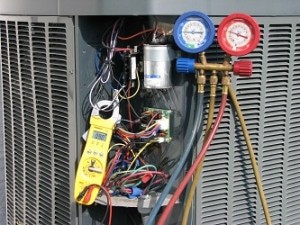
In Phoenix, you may not see too much rain that often; however, it can lash down when it comes. Typically, rain should not damage your system.
Even though heavy rains will not harm your AC unit, the winds accompanying them might cause the condenser fan grille to be damaged by dirt, leaves, twigs, and other debris. Even storm-related things, like tree branches, might do damage to your unit.
Here you can learn more about Phoenix AC repair when you least expect it.
Rain By Itself Won't Harm Your AC or Heat Pump
Your system should be OK with light to moderate rainfall. This is because your outdoor unit's components withstand water and are made of corrosion-resistant materials, such as plastic, aluminum, and copper.
The vital sections of your outdoor unit are sealed, implying that your system should be able to withstand a reasonable quantity of rain and continue to work normally.
However, just because your outdoor unit can withstand rain doesn't mean it can withstand a storm or flood.
Flooding Needs Phoenix AC Repair
While rain will not damage your outdoor air unit or heat pump, flooding or standing water may.
A small amount of water pooling at the bottom of your outdoor unit shouldn't harm your system, but if the water reaches a foot or more, it might cause damage to the system's internal components, such as the motor.
If you detect flooding around or beneath your outdoor unit, take the following steps:
- Turn off your air conditioner or heat pump.
- As much standing water as possible should be removed.
- Allow time for your air conditioner to dry.
- Before resuming use of your air conditioner or heat pump, have a Rescue One Air HVAC technician inspect it for damage.
Storm Debris Might Need AC Repair
In Arizona, the monsoons bring a lot of wind, which means all kinds of debris flying and could end up in your outdoor unit.
Even small debris might cause severe damage to internal components of your air conditioner or heat pump, such as the fan or blower motor on your outdoor unit.
To reduce the odds of debris causing damage to your system, follow these steps:
- Make sure there are no trees or plants directly over your outdoor unit or within a 2-foot radius.
- To prevent debris from falling into your compressor, cover it with a PVC-coated polyester mesh screen.
If you detect debris in your outdoor unit or hear loud banging or clicking noises coming from it, turn off your system and contact a technician right once.
An AC maintenance technician will examine your system and remove debris before it causes severe damage to your air conditioner or heat pump.

Lightning Causes More AC Damage
Lightning can generate a power surge during a thunderstorm, which can damage or even destroy your outdoor unit.
While you may believe that turning off your system will protect it from a power surge, doing so will not isolate it from your home's primary circuit.
Phoenix AC maintenance can install a surge protector as these are the most effective way to protect your HVAC system from damage. If the surge protector detects a surge or spike, the additional voltage is damaged to the ground wire, preventing damage to your system.
Find AC Protection with Phoenix AC Maintenance
We'd be pleased to inspect your AC or heat pump if you've recently noticed flooding, damage, or want to be sure it's working correctly. If you think your system has been damaged, you can Contact Rescue One Air to schedule your air conditioning replacement or find out the range of air conditioning units you can choose.
You can check out our customer reviews or browse through the Rescue One Air video library to see our air conditioning repair crews in action for further information.
